Ah, stealth camping—the rebellious art of sleeping where you’re technically not supposed to, all while wrapped in the cozy confines of a Mercedes Sprinter van (or any other small RV). Because nothing screams “I’m blending in” like a custom van outfitted with solar panels, a rooftop deck, and fairy lights that could guide ships home.
Yet here we are, masters of discretion, or so we’d like to believe.
If you’ve ever felt the urge to park your rolling home in the middle of suburbia without raising an eyebrow—or at least not too many—then welcome to the enigmatic world of stealth camping. It’s like being a secret agent, except instead of saving the world, you’re trying not to get a parking ticket.
I remember the first time I attempted stealth camping. I naively thought that parking a nine-foot-tall van on a quiet residential street would go unnoticed, despite it looking like a small spaceship had landed overnight. Spoiler alert: it didn’t.
But hey, nothing beats the adrenaline rush of waking up at 2 a.m. to the sound of a flashlight tapping against your window. If you’re intrigued by the idea of turning everyday parking spaces into your personal campground, stick around. We’re about to explore the quirks, perks, and pitfalls of stealth camping.
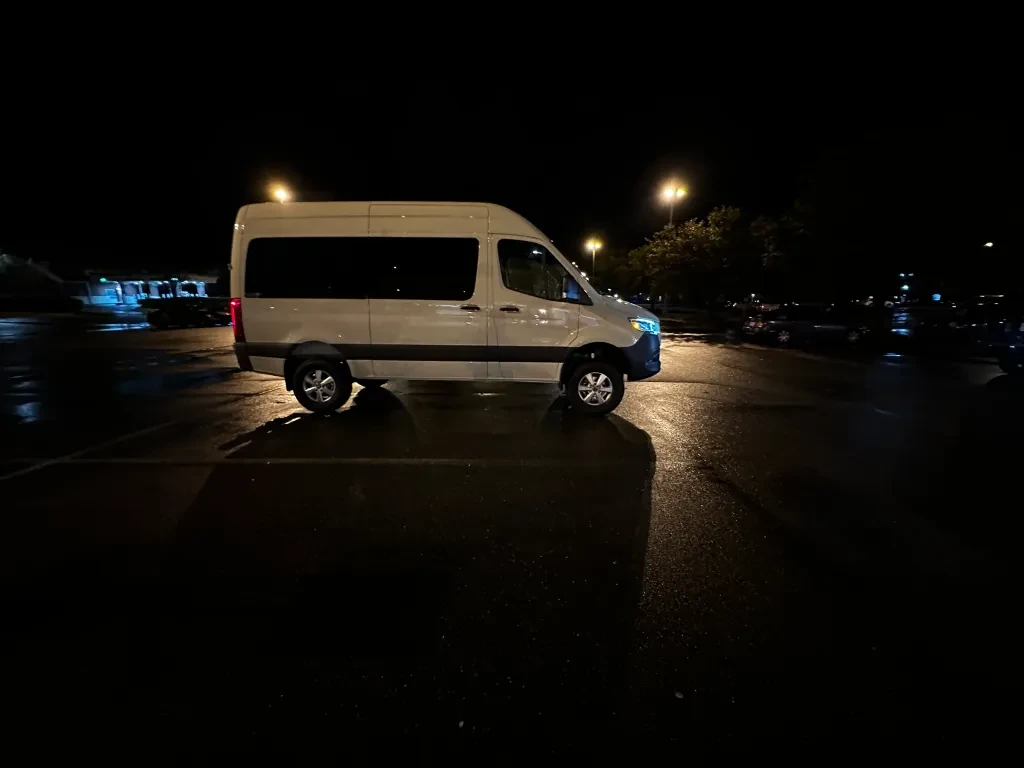
What Exactly Is Stealth Camping?
So, what is stealth camping? It’s the practice of parking your van—or any mobile dwelling—in a location where overnight stays are either discouraged or outright prohibited, all while trying to remain undetected. It’s like being a ninja, but instead of throwing stars, you’re armed with blackout curtains and the ability to hold your bladder for uncomfortably long periods.
The goal is simple: find a spot, hunker down for the night, and slip away in the morning without anyone being the wiser. It’s the ultimate test of your ability to be inconspicuous in a world obsessed with surveillance cameras and neighborhood watch groups.
Stealth camping isn’t just about avoiding campground fees, though that’s a delightful side benefit. It’s about embracing a minimalist lifestyle, reducing your footprint—both carbon and literal—and experiencing the world from a different perspective. It’s about the thrill of waking up in a new place every day, even if that place happens to be behind a strip mall or tucked away on a quiet side street. Stealth camping is a form of urban exploration, a way to reclaim public spaces, or at least that’s what I tell myself when I’m brushing my teeth in a gas station restroom.
PRO TIP: HOW TO: Truck Stop Showers for Non-Truckers
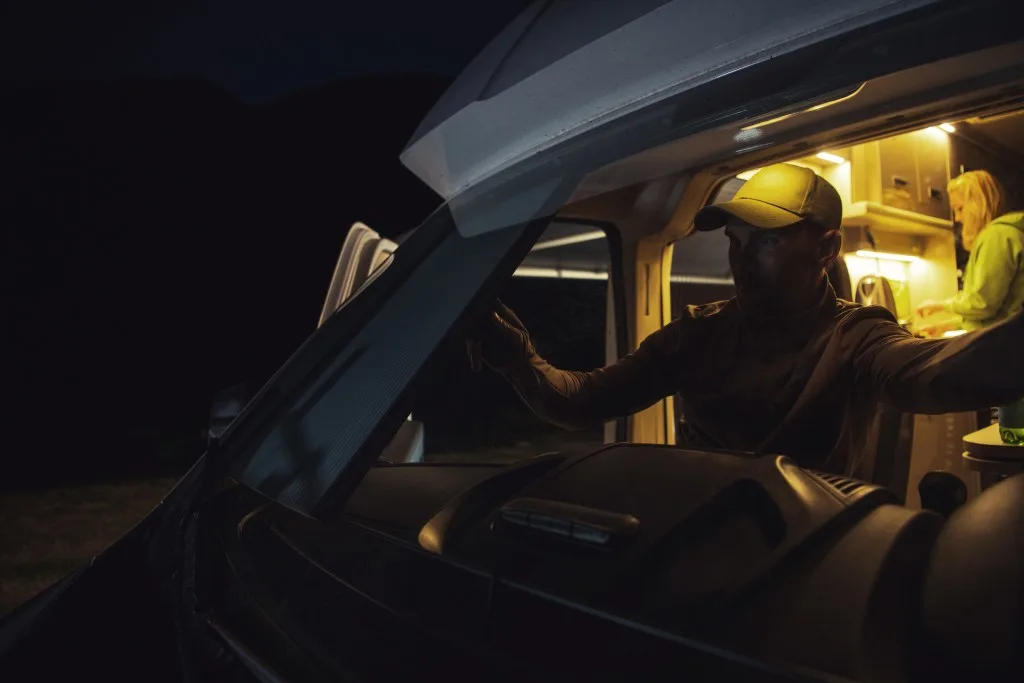
Of course, the term “stealth” might be a bit generous when you’re piloting a vehicle that’s essentially a small apartment on wheels. But that’s part of the charm. The art of stealth camping lies in the details: the unassuming exterior, the careful choice of parking spots, and the practiced nonchalance when a passerby gives your van a second glance.
It’s a delicate balance between being present and being invisible, a skill honed over countless nights spent in the shadowy corners of city landscapes.
Why Do People Stealth Camp?
Why do people subject themselves to this clandestine lifestyle? Is it the allure of saving a few bucks, or is there something deeper at play? For some, it’s about financial freedom. Campground fees, while not exorbitant, add up over time, especially when you’re living on the road full-time.
Stealth camping allows you to stretch your budget, allocating funds to more pressing needs—like that third espresso to combat the sleep you didn’t get while worrying about being towed.
For others, it’s the thrill of the unknown. Each night presents a new challenge, a new environment, and a new story to tell—assuming you make it through the night without incident. It’s a way to break free from the monotonous routines that tether us to conventional living.
When your backyard changes daily, life becomes an endless series of micro-adventures. Sure, sometimes those adventures involve arguing with a security guard or relocating at 3 a.m., but what’s life without a little excitement?
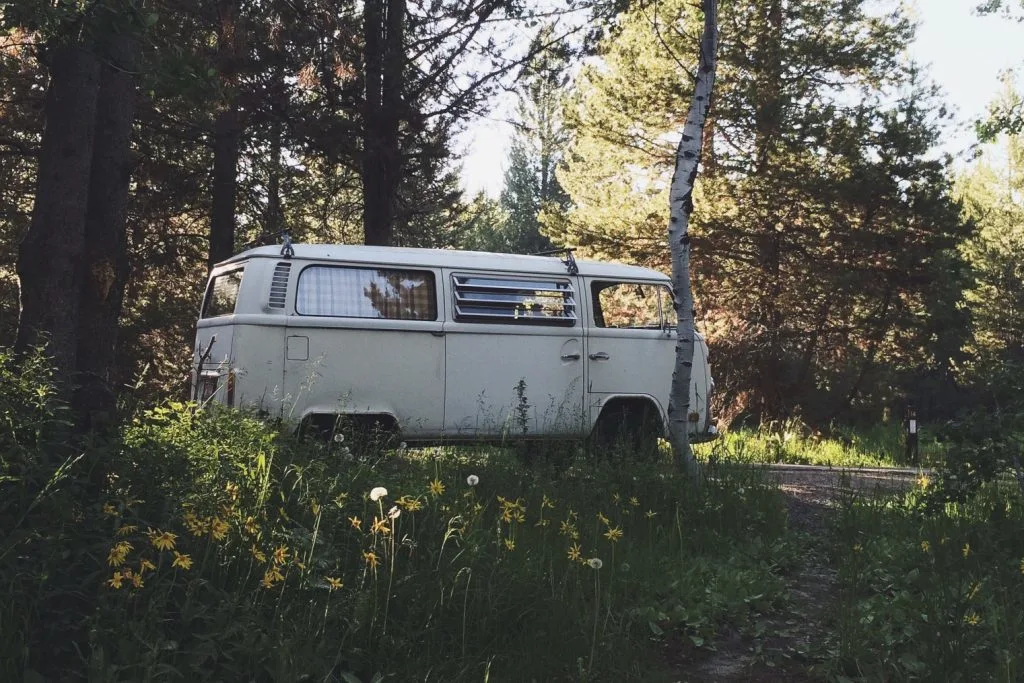
In my case, it’s a blend of practicality and sheer stubbornness. I enjoy the freedom to roam without being constrained by reservations or itineraries. Stealth camping allows me to explore cities and landscapes at my own pace, unencumbered by check-in times or campground rules. Plus, there’s a certain rebellious satisfaction in knowing that I’m living outside the norms, even if those norms are societal expectations about where one should sleep.
Then there’s the community aspect. Stealth campers are a unique breed, bound by shared experiences and an unspoken code of conduct. We exchange tips on the best spots, share stories of close calls, and offer support when things go awry.
It’s a subculture that thrives on mutual respect and a shared love for the road less traveled—even if that road leads to the back of a deserted parking lot. And it almost always leads to the Rubber Tramp Rendezvous.
The Legalities of Stealth Camping
Now, let’s address the elephant in the room—the legal grey area that is stealth camping. Parking overnight in unauthorized areas is generally frowned upon and can range from a minor inconvenience to a criminal offense, depending on where you are and how grumpy the local authorities are feeling that day.
Laws and regulations vary wildly from one city to the next, and sometimes even block by block. Unless you’re a legal scholar with a penchant for deciphering municipal codes, you’re probably rolling the dice each time you settle in for the night.
Some cities have embraced van life, offering designated areas for overnight parking or adopting a more lenient approach. Others have enacted strict ordinances to discourage the practice, complete with hefty fines and the occasional impoundment of your home on wheels. It’s a bit of a legal minefield, but one navigated daily by those willing to accept the risks.
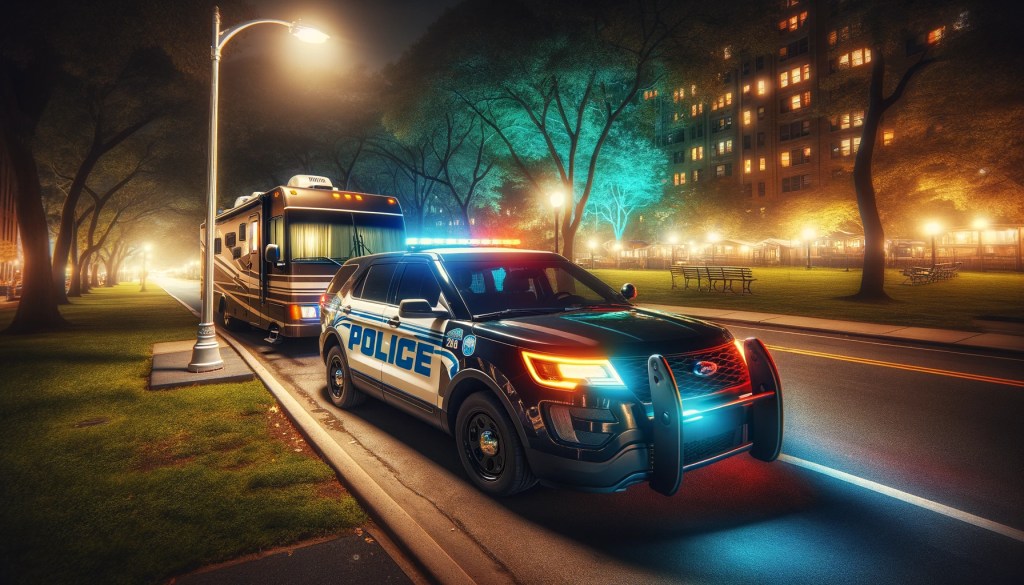
In my travels, I’ve learned that the key is discretion and respect. Parking in front of someone’s house with your engine idling and your interior lights blazing is a surefire way to attract unwanted attention. On the other hand, parking unobtrusively, keeping noise to a minimum, and leaving no trace can often keep you under the radar. Still, even the most conscientious stealth camper can run afoul of local laws.
It’s important to familiarize yourself with the general regulations of the areas you plan to visit. Some places have clear signage indicating where overnight parking is prohibited. Ignoring these signs is not only illegal but also disrespectful to the community.
And while the thrill of bending the rules may be part of the appeal for some, it’s crucial to weigh the potential consequences—not just for yourself but for the wider van life community. A few bad apples can spoil public perception, leading to stricter enforcement and fewer opportunities for everyone.
If you want to make sure you’re stealth camping legally, become a member of Boondockers Welcome.
Tips for Stealth Camping
If you’re still keen on joining the stealth camping club—and who wouldn’t be after all this glowing endorsement—here are some pearls of wisdom gleaned from countless nights spent perfecting the art of being unnoticed.
Blend In With Your Surroundings
Your van’s exterior is your first line of defense. Keep it as unassuming as possible. That means no flashy decals, loud colors, or anything that screams “There’s someone sleeping inside!” A plain white van is the stealth camper’s uniform, blending into urban landscapes like a chameleon in a crayon box.
Choose Your Spot Wisely
Location is everything. Scout potential spots during daylight hours. Look for areas where overnight parking isn’t explicitly prohibited and where your van won’t stick out. Industrial areas, side streets near apartment complexes, and parking lots of 24-hour businesses can be good options.
Just be mindful of private property and any posted restrictions.
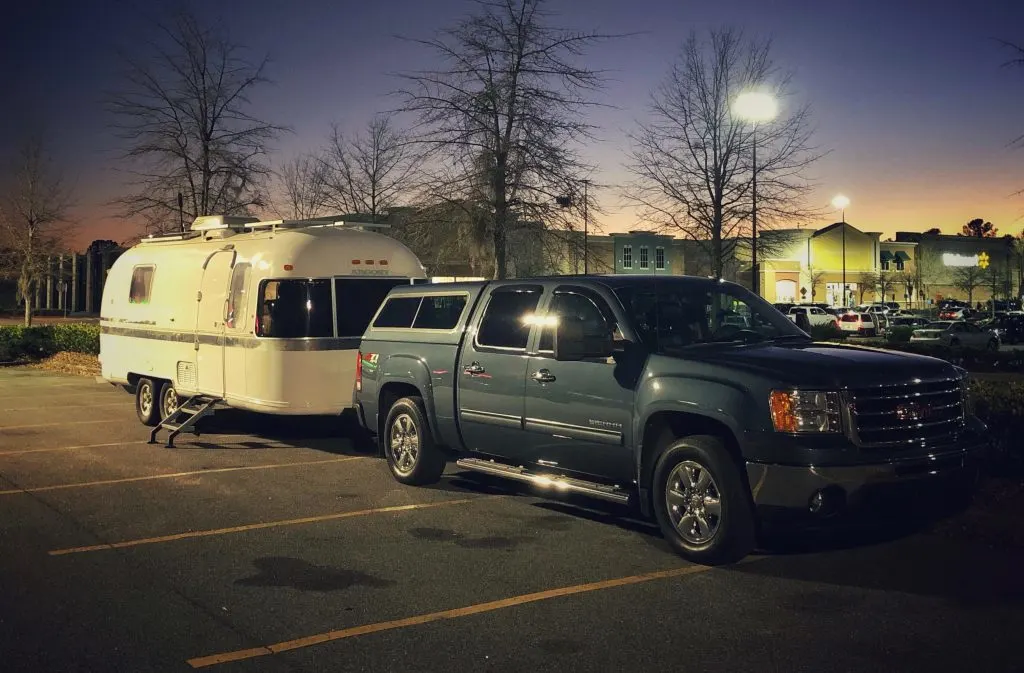
Practice Stealth Etiquette
Arrive late and leave early. Don’t loiter outside your van; the goal is to appear as if your vehicle is just another parked car, not a mobile living space. Keep lights dim, use blackout curtains to prevent any interior glow from escaping, and minimize noise. That means no running generators, loud music, or midnight guitar sessions serenading the neighborhood.
Have a Contingency Plan
If someone knocks—be it law enforcement, security, or an irate local—remain polite and cooperative. Sometimes simply explaining that you’re passing through and will move along is enough. Other times, it’s best to quietly pack up and find a new spot. Remember, confrontation rarely yields positive results.
Be Self-Sufficient
Ensure your van is equipped with everything you need for the night so you don’t have to step outside and attract attention. That includes restroom facilities, water, and any necessary amenities. The fewer reasons you have to exit the van, the better your chances of remaining undetected.
Respect the Community
Leave no trace—no trash, no damage, no evidence of your stay. The goal is to be a ghost, passing through without impacting the area. This not only helps you avoid detection but also fosters goodwill towards the van life community.
Who Is or Isn’t Stealth Camping For?
Stealth camping isn’t for everyone, and that’s perfectly fine. If you relish the comforts of traditional accommodations—like guaranteed electricity, hot showers, and the absence of 2 a.m. wake-up calls from the local constabulary—then perhaps this isn’t your cup of tea. It’s a lifestyle that demands flexibility, resourcefulness, and a certain level of nonchalance in the face of uncertainty.
For the adventurous soul who values spontaneity over routine, stealth camping can be a liberating experience. It’s ideal for those who don’t mind trading some conveniences for the freedom to roam and the thrill of charting their own course. If the idea of waking up in a new place each day excites you more than it scares you, you might find stealth camping to be a perfect fit.
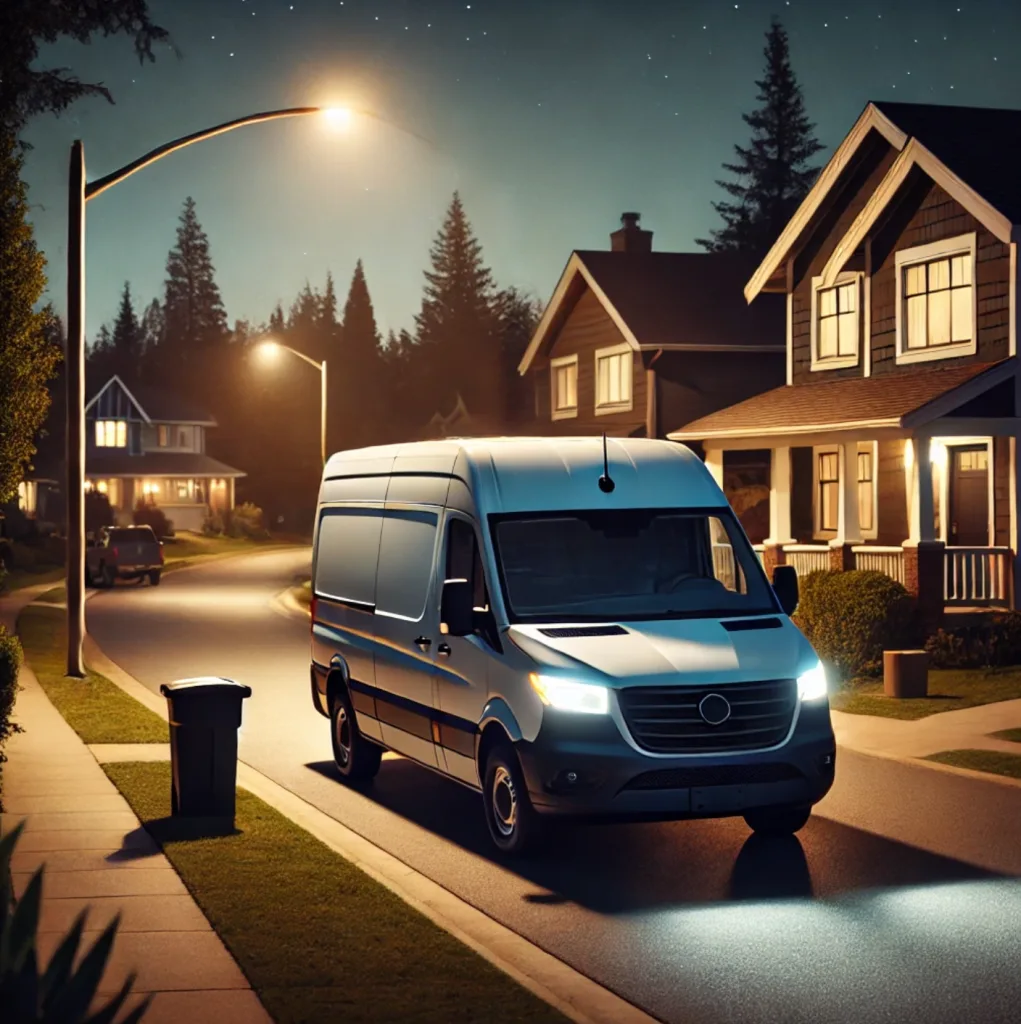
Conversely, if the thought of violating local ordinances induces anxiety, or if you prefer the security of designated camping areas with clear rules and regulations, you might want to explore other options. There’s no shame in opting for campgrounds, RV parks, or even the occasional hotel stay. After all, the essence of van life is about finding what works best for you, not adhering to someone else’s definition of adventure.
In my own journey, I’ve met people from all walks of life embracing stealth camping for different reasons. Some are digital nomads seeking affordable ways to travel while working remotely. Others are retirees exploring the country on a fixed income.
Then there are the intrepid explorers who thrive on the unpredictability of life on the fringes. What unites us is a shared desire to experience the world on our own terms, even if those terms involve the occasional awkward interaction with a parking enforcement officer.
Ultimately, stealth camping is for those willing to accept its challenges and rewards with equal measure. It’s not always easy, and it’s rarely glamorous, but for those who hear the call of the open road and the allure of the unknown, it can be an incredibly fulfilling way to live.
The Best Places for Stealth Camping
Finding the ideal spot for stealth camping is both an art and a science. It requires a keen eye, a bit of local knowledge, and sometimes sheer luck. While there’s no one-size-fits-all answer, there are certain types of locations that tend to be more stealth-friendly than others.
Industrial Areas
These zones are often quiet at night, with plenty of street parking and minimal residential presence to raise suspicions. Just be cautious of any restricted zones or signs indicating private property.

24-Hour Business Parking Lots
Parking near 24-hour businesses like supermarkets, gyms, or big-box stores can be a viable option. Some establishments are known to be more accommodating to overnight parking—looking at you, Walmart—though policies can vary by location and may have changed over time. Always check for signage and, when in doubt, ask permission. It’s amazing how far a polite inquiry can get you.
Residential Streets
These can be hit or miss. In neighborhoods with street parking, your van might blend in among the other vehicles. However, residents may be more vigilant about unfamiliar vehicles, especially in tight-knit communities. If you choose this route, opt for areas with apartment complexes where transient parking is more common.
Rest Areas and Truck Stops
Rest areas and truck stops along highways can offer a respite for weary travelers. While primarily designed for short-term stops, some allow overnight parking. These locations come with the added benefit of restroom facilities and sometimes even showers, though they can be noisy due to constant traffic.

Rural Areas and Public Lands
Rural areas provide another avenue, with the caveat that isolation can be both a blessing and a curse. Parking on public lands, like national forests or Bureau of Land Management areas, is often permitted and can offer stunning natural surroundings. Be mindful of any local regulations and ensure you’re not trespassing on private property—a surefire way to escalate from stealth camping to an unwelcome confrontation.
In my experience, the best spots are those that offer a balance of anonymity and safety. Places where your van doesn’t stand out but also where you’re unlikely to be disturbed. It often takes some trial and error, and over time you’ll develop a knack for identifying promising locations at a glance.
The Pros and Cons of Stealth Camping
Like any lifestyle choice, stealth camping comes with its share of advantages and drawbacks.
Pros
- Unparalleled Freedom: You’re not tied to reservations or itineraries; you can go where you please, when you please.
- Cost-Effective: Eliminates the need for nightly campground fees, which can add up over extended periods.
- Thrill of the Unknown: Each night is a new adventure, a chance to test your resourcefulness and adaptability.
- Self-Reliance: Hone skills that extend beyond camping—like problem-solving, risk assessment, and even diplomacy.
- Unique Experiences: Access to places you might not see if you stuck to traditional accommodations.
Cons
- Constant Uncertainty: Not knowing if you’ll be disturbed during the night or if you’re inadvertently breaking local laws can be stressful.
- Legal Risks: Possibility of fines, legal trouble, or having your vehicle towed is ever-present.
- Lack of Amenities: Often means going without hookups for electricity or water, and public facilities may not always be available.
- Social Isolation: Stealth camping is, by its nature, a solitary endeavor.
- Safety Concerns: Parking in unfamiliar areas can pose risks, both from authorities and potential crime.
In the end, the decision to embrace stealth camping hinges on your priorities and tolerance for uncertainty. For some, the pros overwhelmingly outweigh the cons.
For others, the challenges may be too significant to overlook. It’s a deeply personal choice that depends on your comfort level with risk, your desire for freedom, and your ability to adapt to ever-changing circumstances.
Would You Give it a Try
So, there you have it—the ins and outs of stealth camping, delivered straight from someone who’s spent more nights than they’d care to admit parked behind warehouses and tucked away on side streets. Is it glamorous? Not even close.
Is it rewarding? Absolutely, but in ways that might not be immediately apparent.
Stealth camping is less about the act of sleeping in a van and more about embracing a mindset. It’s about challenging conventional notions of how and where we live, pushing the boundaries of comfort zones, and finding joy in simplicity. It’s not a path paved with certainty, but it’s one that offers unique experiences and a sense of autonomy that’s hard to match.
As for me, I’ll continue navigating the fine line between visibility and invisibility, finding solace in the quiet moments when the city sleeps and my van becomes my sanctuary.
Just don’t be too surprised if you see a Mercedes Sprinter parked unobtrusively on your street one night. I’ll be the one behind the blackout curtains, sipping instant coffee, and pondering where the road will take me next.
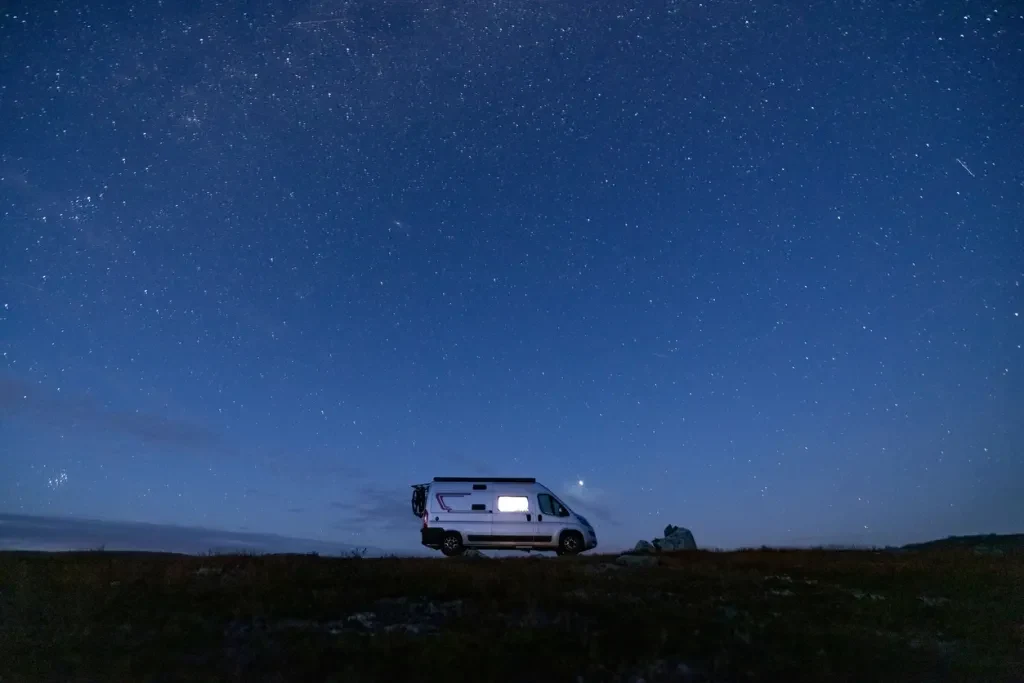
We’ll Help You Find the Best Free Camping in the USA
You should give it a try!
As a matter of fact, these free campsites are yours to enjoy. Every time you pay federal taxes, you’re contributing to these lands.
Become a FREE CAMPING INSIDER and join the 100,000 campers who love to score the best site!
We’ll send you the 50 Best Free Campsites in the USA (one per state). Access the list by submitting your email below:
Stealth camping, I call it wilderness camping. Where I live, you can travel on some back roads and if you pay attention you can see old logging roads that haven’t been used for decades. These are the places I go. Lakes, rivers, streams and great views with no one around for miles. And if you can manage to get a camper trailer in, leave it there. Dig a latrine, sink a sand point, use camouflage, mostly to reduce reflections. But go armed. Not to kill anything but to scare of any bear wolf or whatever curious beasties that comes calling. It’s great.
Your stories have been awesome to read and are very educational. I never realized that there were those situations out there. We always been pretty much local. Enjoy your travels and we’ll get out there soon. Thanks
Just want to know the safest and out of the way to camp